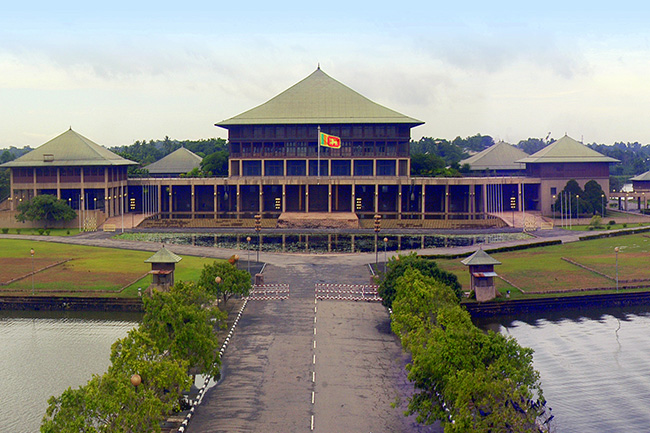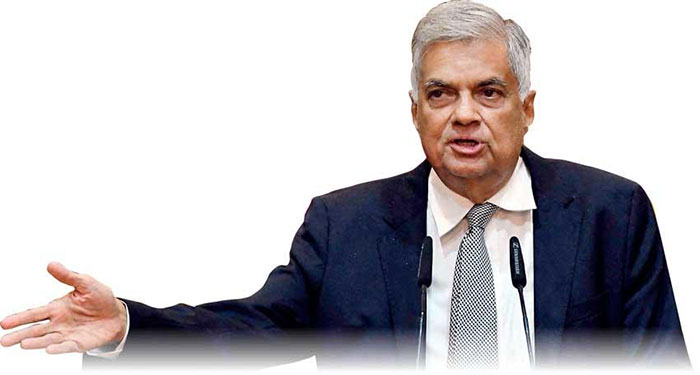FEATURES
Let the Countdown Begin: Parliamentary Elections in March 2024

by Rajan Philips
President Wickremesinghe has now made repeated assurances that the presidential and parliamentary elections will be held in 2024. Financial allocations for the two elections were also announced in parliament. Parliamentary elections are expected to come first, apparently in March 2024, according to news reports citing sources close to the President. Let us assume that the sources are correct and start the political countdown before the official call is made early in the new year. It is going to be a 100-day countdown.
A parliamentary election in March will be the first parliamentary election to be held before the presidential election since the twosome began their co-existence in 1982. In that year of disgrace, President Jayewardene conducted and won the country’s first presidential election, calling the election before his first, appointed, term was over, courtesy of the Third Amendment to the Constitution. He then went on to cancel the parliamentary elections that were due that year by staging an undemocratic referendum and doubled the life of an old parliament.
The purpose of advancing the presidential election was to give himself (JRJ) time to manipulate the timing of parliamentary election. This was on top of the arbitrary power that the constitution gave the executive to dissolve parliament any time after one year of its election. This power of dissolution is an unusual, if not unique, constitutional power vested in the executive over the legislature.
So much for the much vaunted separation of powers. The 19th and 20th Amendments have somewhat limited this power, but even what is left of it privileges the executive over the legislature.
President Wickremesinghe will be exercising the presidential power of dissolution to dissolve parliament and call for elections in March 2024, before they are due more than a year later in 2025. In 1982, President Jayewardene did not want to let go of the massive majority he had in the parliament elected in 1977. He kept it going through the referendum chicanery. No one wants this parliament to keep going except the Rajapaksa MPs. The prospect of its dissolution in March is as good as it can get in the circumstances.
Ranil’s Last Hurrah
So far, President Wickremesinghe has been refusing to use the power of dissolution – in order to delay elections. Not anymore, we hope. Now it makes sense for him to dissolve parliament and have parliamentary elections before the presidential election. If the presidential elections were to come first, Ranil Wickremesinghe would likely have faced two unwelcome choices: not to run as a candidate, or to run and lose. That will be the end of his presidency and he would be long gone by the time the next parliamentary elections are held, as they are due, in 2025.
By calling parliamentary elections in March, Mr. Wickremesinghe will have the opportunity and the power to first ‘preside’ over the election in whatever way he can, and then to appoint the Prime Minister and cabinet of Ministers from among the MPs of the newly elected parliament. Neither of which he would probably be able to do if the presidential elections were to go first. In the most likely situation of no single party winning by a clear majority in the next general elections, President Wickremesinghe will be well positioned to call the shots as he pleases, and all within his constitutional powers. But not quite every shot as he might please.
First, the President should not overplay his hand. For unlike in Thailand, it would be counterproductive to try to thwart the results of a popular parliamentary election through clever-by-half executive means. Second, he has a massive trust-deficit with practically every political party in parliament other than an insufficient number of Ministers and MPs who would like to see him continue as President for their own self-serving ends. It will all depend on how the President conducts himself during the parliamentary election.
If he were to take sides or take to machinating between MPs and Parties to forge a new alliance for the election, he had better make sure that such an alliance would be a winning alliance. Otherwise, and that is more likely to be the case, he would be a goner by the time his (really Gota’s) term is up. On the other hand, if he were to exercise enlightened selfishness and stay above the electoral fray, he may have a chance to form a consensus government in the new parliament and take yet another shot at extending his political life. But that will be quite a long shot even for a man who is known for playing the long game.
The revelations that TNA MP Sumanthiran recently made in parliament, about the manner in which Ranil Wickremesinghe broke opposition consensus and broke ranks to become Gotabaya’s crisis Prime Minister, are quite damaging. Add to that, President Wickremesinghe’s recent shenanigans with the Judiciary, the Constitutional Council, and with the appointment of the IGP, have left him thoroughly discredited and untrustworthy. Adding injury to insult, he has appointed the universally lampooned and reviled Deshabandu Tennakoon as the new IGP for a three month term. The upshot of all of this is that no one contesting the next parliamentary election would like to have anything to do with President Wickremesinghe. Other than the irrationally selfish.
Framing the Elections
At the same time, there is no shortage of irrationality or selfishness in Sri Lankan politics, and going by Mr. Wickremesinghe’s long past, he is not going to remain quiet or neutral as President in the next parliamentary election. He may even pull up the abolition card and play it one more time and tack a referendum question on abolition to the vote at the parliamentary election. Whatever Ranil Wickremesinghe may or may not do, the elections should not be about Ranil Wickremesinghe, and he should not be allowed to frame the election.
The elections should be about the possibilities and the potentialities for a Sri Lanka that is finally becoming free from two decades of Rajapaksa-Wickremesinghe political monopoly. The elections will also be about how Sri Lanka is going to be led out of the economic pits by those now vying for power. Then there are carryovers all the way from the twentieth century which have not been addressed but only aggravated during the Rajapaksa yugaya of this century.
The election will be framed by the dialectic of the contenders for power and/or parliamentary seats, and their positions on the manifold issues and problems that are preoccupying the people.
The SJB and the NPP have been calling for elections for almost two years and now they will get their chance to show what they are capable of. The remnants and rumps of the historically governing parties – the UNP, the SLFP and the SLPP will not have any significant identity of their own, but they may not all go into alliances with either the SJB or the NPP. Also, in a parliamentary election there is space for political parties and individuals to enter into multiple alliances.
It will be interesting to see who will be allying with the SJB, and if any of the recognized political parties will be joining the NPP/JVP formation. Any of the Sinhalese parties who are not part of either the SJB or NPP alliances, will not likely be significant players in the election, but may gain specific weights after the election as contributors to a governing majority in return for ministerial portfolios. If it were the first-past-the-post system, the Rajapaksas would probably be wiped off the electoral slate, but some of them could still manage to return because of proportional representation and preferential voting.
The political parties of the Sri Lankan Tamils, Muslims and the Indian Tamils will have their respective, and in some cases overlapping, universes, with their corresponding national overtones. The TNA will likely have to go through a leadership change before the election which may create internal rivalries even as it tries to ward off external rivals especially in the Northern Province. In the East, Sri Lankan plurality will be electorally reproduced with proportionate returns of Tamil, Sinhalese and Muslim MPs.
Political parties of the Indian Tamils, as well as Muslim political parties, have usually joined one or the other of the two main contending alliances. Where they will land this time remains to be seen. Some are with the SJB, while those who are with the current ‘government’ of President Wickremesinghe may have to find new suitors if they are to be relevant after the elections.
Again, it will be interesting to see if the JVP would be able to attract and accommodate any of the minority political parties under its NPP umbrella. It is known that the JVP and especially its leader Anura Kumara Dissanayake have excellent working relationship with many of the Tamil, Muslim and Indian Tamil political leaders, but whether the JVP would be able to draw them into a formal alliance is one of the crucial questions that will be answered during the countdown period.
Even a broadened NPP alliance will not be broad enough if it fails to include one or more of the minority political parties. On the other hand, an NPP alliance that includes minority political parties would send a powerful signal that the JVP/NPP has come of age electorally. Anything less would only mean that the JVP continues to immature in spite of age.
The countdown and the campaign will see shifting focuses around issues along with competing defenders and detractors. The main issues and those that matter are on people’s minds and in their still harrowing living and medical experiences. Then there are issues that preoccupy the pundits and elicit editorial commentaries. How will political parties and alliances respond to them? As well, the formation of political alliances and groupings will be implicated by their positions on the issues and problems facing the country, and will in turn implicate how different issues or privileged or prioritized.
The economic crisis will provide an arresting backdrop to the election campaign. President Wickremesinghe presented his budget on November 13, outlining his purported plan to take Sri Lanka out of the economic crisis. The very next day, the Supreme Court came down with its ruling on the fundamental rights applications against decision makers in the Gotabaya Rajapaksa Administration. The Court apportioned blame for decisions made wrongfully by elected and unelected officials that precipitated Sri Lanka’s worst and its only “man-made” economic crisis.
The voters deserve to know where the SJB, the NPP and everyone else running for election stand on the economy – the current crisis, its perpetrators, and a plausible way out. The upcoming election will also provide a new opportunity for the Catholic Church hierarchy to reiterate the yet unanswered questions about the perpetrators of the 2019 Easter Sunday tragedy. There are shortages of all kinds in Sri Lanka. But there is no shortage of election issues.

